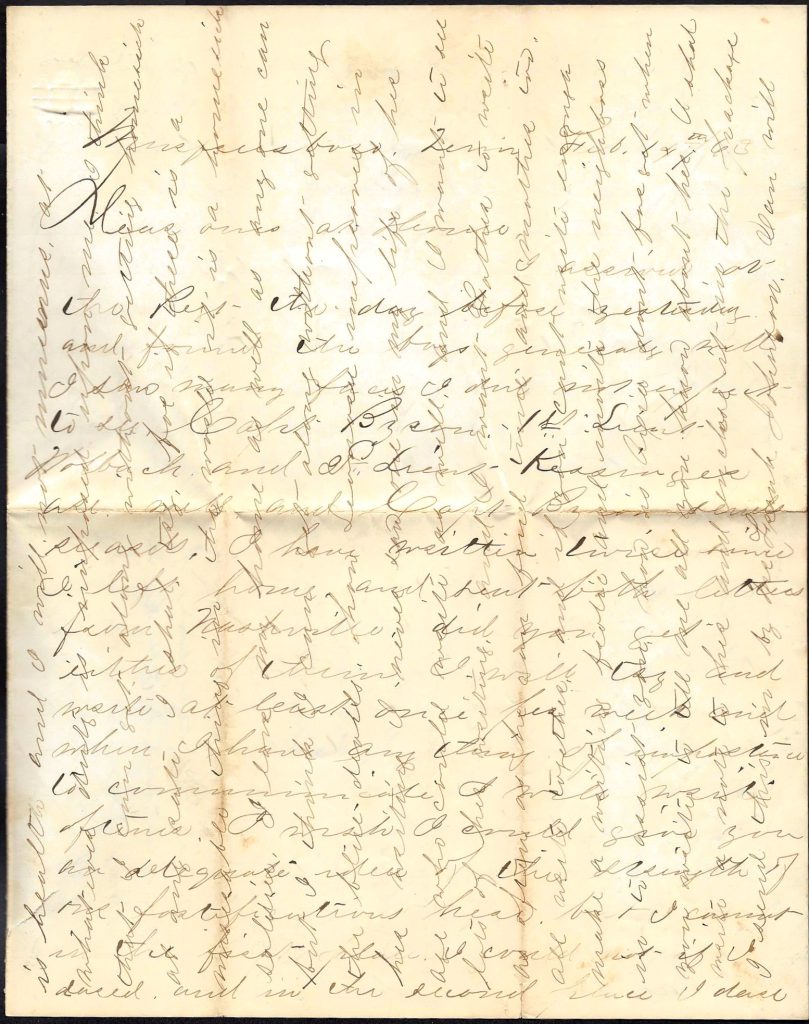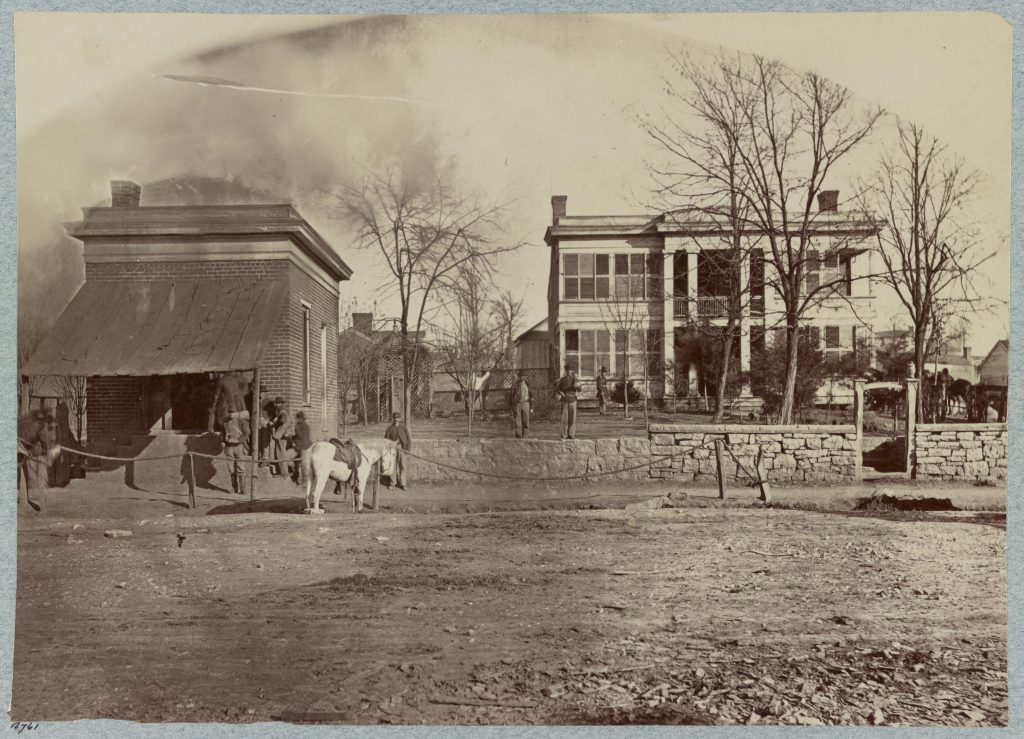Research Arsenal Spotlight 18: George P. Jarvis of the 3rd Ohio Infantry
George P. Jarvis was born in 1842 to Leonard R. Jarvis and Susan (Thomas) Jarvis of New England, Athens County, Ohio. He also had a sister, Leonora Jarvis, born in 1850. George P. Jarvis served as a corporal in Company C of the 3rd Ohio Infantry, first in enlisting in the 3 months version of the regiment and then afterward enlisting for three years.
In our collection, we have eight letters written by George P. Jarvis during his service with the 3rd Ohio Infantry during 1862 and 1863. The first letter was written May 13, 1862, from Huntsville, Alabama, where George P. Jarvis was already suffering for the effects of the warm, southern climate, which he described to his family:
“The weather is very hot here now although it is only May and the Devil only knows how hot it will be next month. I think, however, that six or eight months will close this thing up.
Everything looks beautiful here as the season is quite forward. Corn is in some places waist high while in Ohio they can’t be more than just planting. Cotton is coming up finely and planters say looks well. I would not know anything about it if not told. The planters are generally very rich here — some of them own as many as six hundred slaves.”
In the same letter, he also described a letter written by a Confederate soldier serving in Hindman’s Legion, which he found and forwarded to his parents:
“The enclosed letter is one that I picked up. The writer, it seems, was a member of Hindman’s Legion — the same we shelled at Bowling Green. It seems from his letter that they were not whipped, they only ran to prevent such a catastrophe. He is wrong as regards the number killed as there was not a person killed during the whole cannonade. It will give you a pretty good idea of Southern intellect.”
George P. Jarvis in Murfreesboro, Tennessee.

In February of 1863, the 3rd Ohio Infantry was doing duty at Murfreesboro, Tennessee. George P. Jarvis had been away from the regiment for quite some time after being wounded at the Battle of Perryville in October, 1862. Upon his arrival he was very satisfied with the fortifications around Murfreesboro, writing:
“I wish I could give you an adequate idea of the strength of the fortifications here but I cannot. In the first place, I could not if I dared, and in the second place, I dare not if I could. Suffice it to say that should the enemy attack us here with the recent acquisition of forces we have received, they would most certainly be defeated.”
He also went on to describe the current state of the area around Murfreesboro and Nashville after prolonged fighting, and how much it had been ravaged by the war since he had last seen it:
“Last night Dan and I went over to the 18th Ohio and stayed all night. Had a very pleasant time. Got back this morn at ten o’clock. I was surprised to find the appearance of the country so materially changed from what it was one year ago or even since last Autumn when we passed over the country last. Then the fences were all up and everything betokened a thriving and industrious people. Now the whole aspect is changed. There is not a fence to be seen between Murfreesboro and Nashville and everything shows plainly the devastation and ruin that has been visited upon it. Yet such is the fortune of war while the people of our own neighborhood — which by the way is not the most wealthy position of creation — are living in comparative opulence and ease, the people of this country — a county which in civil times ranked among the highest for wealth, opulence, and industry — are many of them wanting the most common necessities of life, and many are living on what in former times their own slaves would have denounced as unfit to eat. Would you like to have the war brought to your own door? I know well what your answer is. For my part, I would rather serve in this army for the term of my natural existence than have you suffer for one short six months the privations and trials of having a hostile force in your midst.”
The 3rd Ohio Infantry Captured by Confederate Forces.
The 3rd Ohio Infantry participated in Streight’s Raid in late April and early May, 1863 and were nearly all captured outside of Rome, Georgia on May 3, 1863. At the time, George P. Jarvis was serving as a clerk in the hospital, and consequently was one of the few not captured. In a letter written May 18, from Corinth, Mississippi, he expressed his belief that his regiment would soon be exchanged and reunite. Humorously, he believed that this would likely lead to him being sent home temporarily to save the government money while the regiment reorganized:
“Suppose I should be at home soon. Would it not surprise you? It would not me since I know that our entire regiment is captured with the exceptions of the twenty-two that are here now. They will of course be paroled and go to Columbus and of course there being so few of us will be ordered to join them, and the Gov. — not wishing to pay our board bill while we are doing nothing — will send us home. Now do not make up your minds to see me for this is only my opinion, but just consider me as absent till my time is out and then if I get home before, why! you will be disappointed, that’s all.”
George P. Jarvis in Chattanooga, Tennessee

The final letter written by George P. Jarvis in the Research Arsenal collection is datelined from Chattanooga, Tennessee and was written on October 10, 1863. By this time the 3rd Ohio Infantry had been exchanged and reorganized before being sent back out to duty.
In his letter, George P. Jarvis described some of the situation outside of Chattanooga as he awaited another clash with the Confederate Army:
“Matters at the front seem unchanged. They still appear to occupy the same ground they have occupied all along since the battle, and for the past two or three days they have shown no disposition to shell us. A part of their force is nearly in plain sight. I saw them today. They seem to be throwing up new works in the position they now hold. And they are so very near us that with some heavy guns they might do us considerable damage. Several times their sharpshooters have thrown minnie balls whizzing about our ears but no one hurt yet from them. One contraband was killed and one soldier wounded the other day by shells, but I don’t know but that I spoke of this in a previous letter. You ought to be here and see them sometimes. They look quite well at a distance, but in this case “distance” surely “lends enchantment to the view.” I had much rather behold them at that distance than have them any closer. They have a peculiar way of making themselves very unpleasant visitors.”
George P. Jarvis also boasted about the high opinion some of the Confederate Forces of Longstreet’s Corps held of the 3rd Ohio Infantry saying:
“The men of Longstreet’s Corps were very greatly surprised when they came here and found that we did not run at the first fire and those of them that I have seen say there is a vast difference between fighting us and the eastern army. They don’t call us Yankees at all. We are the “western men” and those of the eastern army are the ‘yankees.’”
In June, 1864, George P. Jarvis mustered out of the 3rd Ohio Infantry with the rest of the regiment. He went on to enlist as a quartermaster sergeant in the 18th Ohio Infantry in November, 1864 and served until the end of the war, finally mustering out for good on September 4, 1865 with the rank of 2nd lieutenant.
In 1873 George P. Jarvis married Roxavilla Beebe. He passed away in Parkersburg, West Virginia, on July 30, 1920.
We’d like to extend a special thanks to William Griffing of Spared & Shared for transcribing and sharing these letters.
To read the rest of George P. Jarvis’ letters and access thousands of other Civil War documents, sign up for a Research Arsenal membership.
Check out some of our other spotlight collections like Robert Alexander Garner of the 21st South Carolina Infantry and Andrew Jackson Clark of the 23rd Massachusetts Infantry.

